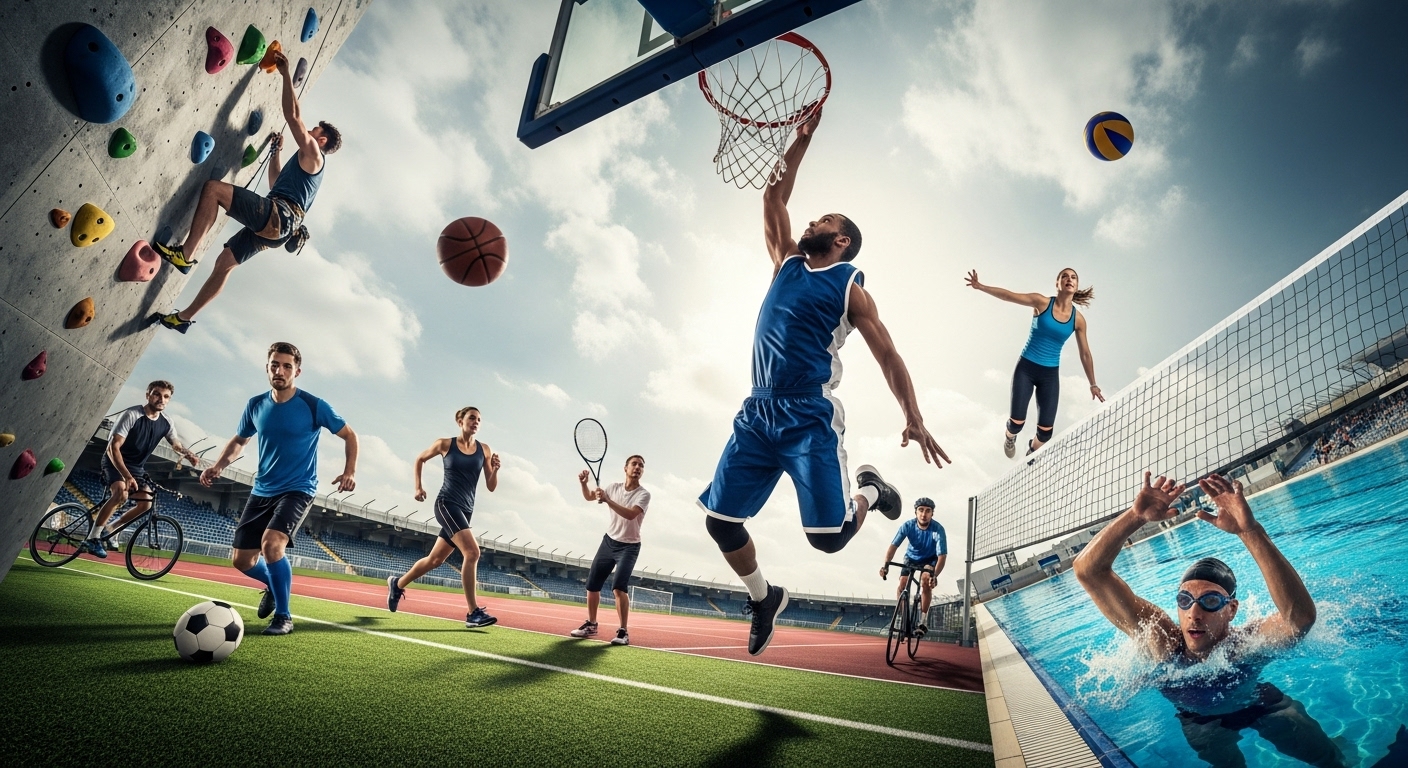Introduction: The Universal Language of Sports
Sports have long been an integral part of human civilization, transcending boundaries of geography, culture, and language. They unite people in celebration of skill, strategy, endurance, and teamwork. Whether played on grassy fields, indoor courts, icy rinks, or virtual arenas, sports ignite passion and foster a sense of belonging.
In this blog, we will explore the multifaceted impact of sports — from the physical and mental benefits to their cultural significance and social influence. We will also delve into how sports continue to evolve and inspire across generations, shaping both individual character and collective identity.
The Evolution of Sports: From Ancient Rituals to Modern Competitions
The origins of sports can be traced back thousands of years, often linked to rituals, survival skills, and community bonding. Ancient civilizations like the Greeks held athletic competitions that not only tested physical prowess but also honored the gods.
The Olympic Games, revived in the late 19th century, symbolize the enduring spirit of friendly competition and global unity. Over time, new sports emerged, adapted to changing societies and technological advancements.
Today, sports encompass a vast array of disciplines including traditional team sports like soccer and basketball, individual competitions like tennis and athletics, and emerging formats such as eSports.
Physical and Mental Benefits of Engaging in Sports
Participation in sports offers profound health benefits. Physically, regular activity improves cardiovascular fitness, strength, flexibility, and coordination. It helps combat obesity, reduces risk of chronic diseases, and promotes longevity.
Mentally, sports foster resilience, discipline, and stress relief. The focus and determination required can enhance concentration and cognitive function. Team sports, in particular, develop communication skills, empathy, and emotional intelligence.
Sports also contribute to improved self-esteem and confidence by setting goals and overcoming challenges. The joy of achievement, whether in victory or personal improvement, nurtures a positive mindset.
Sports as a Cultural Phenomenon
Sports are deeply woven into cultural identities worldwide. They reflect societal values, historical narratives, and communal pride. National teams become symbols of unity, while local clubs strengthen community bonds.
Events like the FIFA World Cup, the Super Bowl, and the Wimbledon Championships captivate global audiences, creating shared experiences and traditions. Rituals surrounding these events — from fan chants to celebratory dances — enrich cultural expression.
Sports also serve as a platform to highlight social issues and promote inclusion. Iconic athletes have used their visibility to advocate for civil rights, gender equality, and peace, demonstrating sports’ power beyond the playing field.
The Role of Sports in Education and Youth Development
Sports play a crucial role in education systems, offering more than just physical activity. School sports programs teach teamwork, leadership, time management, and ethical conduct.
Youth engagement in sports provides a constructive outlet for energy and creativity, steering individuals away from negative influences. It instills values of fair play, respect, and perseverance.
For many young people, sports open pathways to scholarships, career opportunities, and personal growth. Coaches and mentors inspire discipline and ambition, guiding youth towards fulfilling their potential.
Technology’s Impact on Sports Performance and Spectatorship
Advances in technology have transformed how sports are played, analyzed, and enjoyed. Wearable devices track athletes’ biometrics, enabling precise training adjustments and injury prevention.
Video replay systems and analytics enhance officiating accuracy and strategic decision-making. Innovations in equipment design improve safety and performance standards.
For spectators, high-definition broadcasts, virtual reality, and interactive platforms offer immersive experiences. Fans engage through social media, live stats, and fantasy leagues, deepening connection with their favorite sports and athletes.
Women in Sports: Breaking Barriers and Shaping the Future
Historically, women faced significant obstacles in sports participation. However, increasing recognition and support have propelled female athletes into the spotlight, challenging stereotypes and inspiring new generations.
Women’s sports leagues, from soccer to basketball, continue to grow in popularity and professionalism. Iconic figures exemplify excellence and leadership, advocating for equal pay, media coverage, and opportunities.
Gender inclusivity initiatives promote diverse participation, ensuring sports remain a space where talent and passion thrive regardless of identity.
Sportsmanship and Ethics: The Heart of True Competition
At the core of sports lies the principle of sportsmanship — respect for opponents, officials, and the game itself. Ethical conduct maintains the integrity and spirit of competition.
Doping, cheating, and corruption threaten to undermine trust and fairness. Combating these issues requires vigilance, education, and strong regulatory frameworks.
Celebrating not only victory but also effort, humility, and teamwork cultivates a healthy sports culture where all participants can flourish.
Community Building Through Sports
Local sports clubs, recreational leagues, and grassroots initiatives create opportunities for social interaction and cohesion. They bring people together across ages, backgrounds, and abilities.
Sports facilities often serve as community hubs, promoting health and wellness. Volunteerism and fan support generate collective pride and a sense of belonging.
Inclusive programs encourage participation from marginalized groups, fostering diversity and breaking down social barriers.
The Economic Significance of Sports
Sports generate significant economic activity worldwide. Professional leagues, tournaments, and merchandising contribute billions in revenue.
Employment opportunities span athletes, coaches, event organizers, broadcasters, and support staff. Sports tourism attracts visitors and stimulates local businesses.
Investments in infrastructure and youth development ensure sustainable growth, benefiting societies economically and socially.
The Future of Sports: Innovation and Inclusivity
As society evolves, so does the world of sports. Emerging trends include eSports gaining mainstream legitimacy, increased use of data analytics, and adaptive sports for people with disabilities.
Environmental sustainability is becoming a priority for events and organizations, promoting eco-friendly practices.
Globalization facilitates cross-cultural exchanges and broader access, while digital platforms redefine fan engagement.
The future promises sports that are more inclusive, innovative, and impactful.
Conclusion: Celebrating the Power of Sports
Sports are more than games or competitions. They are a vibrant expression of human potential, resilience, and community spirit. From the thrill of victory to the lessons learned in defeat, sports enrich lives and cultures around the world.
As we celebrate athletes and fans alike, it is essential to nurture sportsmanship, inclusivity, and integrity. By doing so, we honor the true spirit of sports — a universal language that inspires, connects, and empowers.



